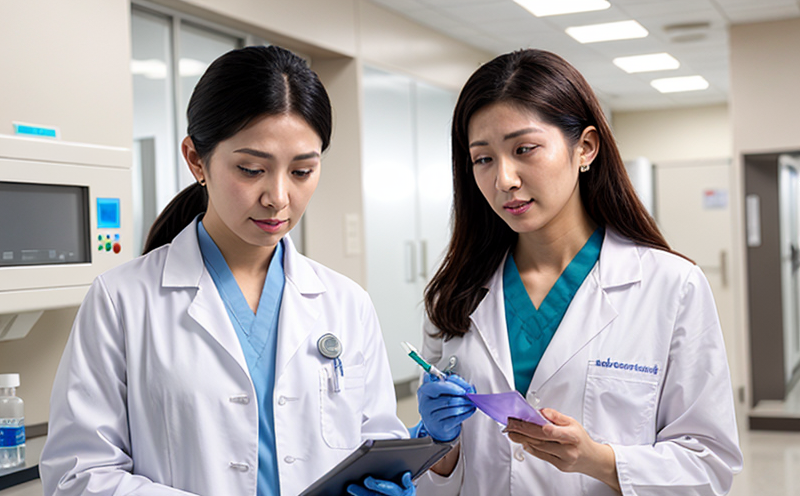Comparative Clinical Immunogenicity Testing of Biosimilars
In today’s rapidly evolving healthcare landscape, biosimilars have emerged as a critical component in the treatment of various diseases. Comparative clinical immunogenicity testing plays an essential role in ensuring that these biopharmaceuticals meet stringent quality and safety standards before they reach the market.
Immunogenicity refers to the body’s immune response against foreign substances, such as proteins or peptides present in pharmaceutical products. This reaction can lead to adverse effects on patients who are treated with these substances. Therefore, it is imperative for manufacturers of biosimilars to conduct thorough testing to understand and mitigate potential immunological risks.
Our laboratory specializes in performing comparative clinical immunogenicity tests that compare the immune responses triggered by different biosimilar products or between a biosimilar and its reference product. This service ensures regulatory compliance with guidelines such as those provided by the International Conference on Harmonisation (ICH), FDA, EMA, and other relevant authorities.
The testing process involves several stages aimed at identifying any differences in immune response profiles between two or more biopharmaceuticals. These stages include:
- Sample Collection: Blood samples are collected from patients under controlled conditions.
- Preparation and Storage: Specimens undergo rigorous preparation procedures to ensure their integrity before analysis.
- Laboratory Analysis: Advanced analytical techniques are employed, including but not limited to ELISA (Enzyme-Linked Immunosorbent Assay), flow cytometry, and bioassays designed specifically for biologics. These methods help detect antibodies directed against the therapeutic proteins.
- Data Interpretation: Statistical analysis is performed to evaluate changes in antibody titers over time or differences between groups receiving different treatments.
The results of these tests are crucial for several reasons. Firstly, they provide valuable insights into the safety profile of a biosimilar product compared to its reference counterpart. Secondly, they assist regulatory bodies in making informed decisions regarding approval and labeling. Lastly, this information can guide further clinical trials aimed at optimizing treatment regimens.
It is important to note that while some tests may focus solely on short-term effects, our comprehensive approach also considers long-term outcomes. By understanding how the body reacts over extended periods, we contribute significantly to improving patient care and ensuring public health protection.
Why It Matters
The significance of comparative clinical immunogenicity testing cannot be overstated in the realm of biosimilars. As previously mentioned, these drugs are designed to mimic naturally occurring proteins found within our bodies but synthesized artificially through biotechnology processes. Despite their structural similarities to their reference products, there can still exist subtle differences that might influence how they interact with an individual’s immune system.
One key aspect worth noting is the concept of cross-reactivity – when antibodies produced against one protein also react with another structurally similar substance. If a biosimilar induces such reactions more readily than its reference product, it could lead to adverse events like allergic responses or reduced efficacy. Our testing helps identify these potential issues early on in development stages.
Furthermore, immunogenicity studies play a vital role in assessing the interchangeability of biosimilars with their respective references. Interchangeability implies that switching between two equivalent products should pose minimal risk to patients’ health and maintain consistent therapeutic effects. By demonstrating low immunogenicity across multiple populations, we provide strong evidence supporting this claim.
Finally, compliance with regulatory standards ensures trust in both the product itself and its manufacturer. Regulatory authorities worldwide recognize the importance of rigorous testing protocols when evaluating biosimilars for market entry. Adherence to these guidelines not only facilitates smoother approval processes but also enhances consumer confidence through transparent communication about safety profiles.
Applied Standards
In conducting comparative clinical immunogenicity tests, our laboratory strictly adheres to internationally recognized standards and recommendations. These include:
- ICH Q5E: This guideline provides comprehensive direction on the assessment of immunogenicity for biotechnology-derived products.
- FDA Guidance: The U.S. Food and Drug Administration issues detailed guidance documents outlining best practices in this field.
- EMA Guidelines: The European Medicines Agency also provides recommendations that align closely with ICH guidelines to ensure harmonization across different regions.
Our team stays up-to-date with the latest developments and updates from these bodies, ensuring our services remain compliant and reliable. We employ state-of-the-art methodologies consistent with current scientific knowledge, allowing us to deliver accurate and actionable results promptly.
Benefits
The benefits of Comparative Clinical Immunogenicity Testing extend beyond mere compliance; they offer tangible advantages for all stakeholders involved in the biosimilar lifecycle:
- Enhanced Patient Safety: By identifying and minimizing risks associated with immunological reactions, our tests contribute directly to improved patient safety.
- Facilitated Regulatory Approval: Compliance with stringent regulatory standards enhances the likelihood of successful approval processes while reducing delays.
- Optimized Treatment Protocols: Insights gained from these studies inform clinicians about optimal dosing schedules and treatment durations, leading to better outcomes for patients.
- Informed Decision-Making: Data derived from our tests enables manufacturers to make well-informed decisions regarding product development, quality assurance measures, and marketing strategies.
- Increased Market Confidence: Demonstrating robust safety profiles through comprehensive testing builds trust among healthcare providers, payers, and consumers alike.
- Potential Cost Savings: Early identification of potential issues can prevent costly recalls or product withdrawals later in the lifecycle.
Ultimately, our service plays a pivotal role in ensuring that biosimilars not only meet but exceed expectations set forth by regulatory bodies and industry standards. This commitment to excellence reflects our dedication to advancing healthcare through reliable scientific evidence.





